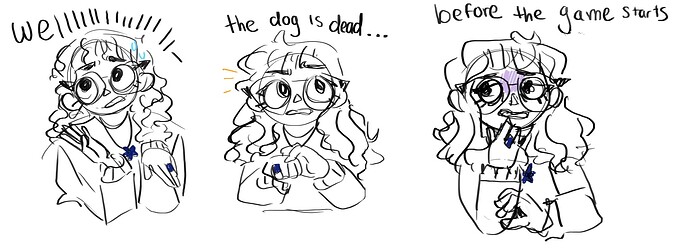SPILL YOUR GUT by Coral Nulla
A disorientating game in more ways than one—in a good way. Visually, you have the stark, bright colors of the UI, the retro Decker font, the narrow text window; then there’s the navigation, which is made literal as you click “open the door” links that lead your current PC on and on, walking down an endless tunnel or through a maze of rooms, or “go up one floor” in a virtual elevator that never ends. Then there’s the fact that, if you want to return to the main menu to continue with the next character, you have to refresh the page, which feels counterintuitive—normally, you don’t want to lose your progress! But here it’s the only way to get back.
I loved the physicality of it, captured in such a simple interface. Click a door, move to a new passage of text, repeat. You wander as the characters wander as their thoughts wander. It created a level of anxiety, especially in Uma’s section, where the thought trail meandered up, down, right, and left, making me hunt for it. I felt lost just like the three GUT members feel lost; I felt anxious and tired just like they feel. But I was also mesmerized, not wanting to miss any of their ruminations about relationships, a traumatic past, their place in the world, their future. It’s all rather sad and bleak, but again, in a good way, a way that made me feel things, that made me connect with these characters. The endless “I am tired” / “I am lonely” / “I am scared” messages when each of the three thought trails end, but you can still keep wandering. Lines like “it’s dark and wet and red. or i am.”
Then… there’s Stace. Stace, who does not have a customized UI, and who just wants to eat chips (as in French fries, not Lays).
Stace knows what’s behind the forbidden door. Stace knows what’s at the top of the tower. Stace knows what happens at the end. The world is cruel and unforgiving.
That’s why Stace eats chips.
The band she manages want to try again at making a movie, but she still thinks they’d be happier just enjoying life rather than trying to make meaning. It’s a miracle they’re alive. Don’t make it complicated.
It’s such a contrast to the slow, despairing ruminations of the three GUT members, with all their longing and seeking. Stace is acceptance. Through an over-the-top chase scene, through death, rebirth, death, and rebirth again, trips to heaven and hell (“after finding out why she has been sent to this place, the devil decides that god is problematic and heaven is cancelled” really got me), she remains unperturbed, simply continuing to eat chips. Until finally:
she herself becomes a chip. This is a relief, because it was getting kind of horrifying, and Stace eats chips for light pleasure, not existentialism.
As a chip, she herself is eaten, digested, excreted, and finally dispersed.
This, then, is true happiness: nothing to do, nothing to worry about, nothing to fear.
BUT, Stace’s entire narrative, it’s been revealed, is getting narrated to us by Jack, the self-proclaimed god who’s been responsible for her many deaths. Why should we take his word for it? Shortly after this the game ends, fittingly somehow (how else do you end a game like this?), on a faux-error screen.
Two final notes that didn’t quite fit anywhere else:
Both Gemma and Uma are told not to open a certain door, the single colored one in a sea of monochrome ones. Well, guess what I did as both Gemma and Uma. I had to know! Tillie, in contrast, wants to find a green door. In the final segment, Jack tells us the outcomes for all three:
Gemma stepped through the door and into an industrial blender. She’s only particles now. (I slurp my milkshake.) Uma entered a closet and became a stuffed toy. (I squeeze a teddy with long blue hair; it moans.) And Tillie, well, she never found the door. She got lost and starved. (I smile.)
Nooo, I doomed them with my curiosity! Not literally—see above; there’s no state tracking—but it feels like I did, because I did specifically choose to open the forbidden doors.
Second: I played this game last week, and wasn’t thinking about it at all when, last night at the grocery store doing the necessary weekly shopping, I had an urge to buy chips (Lays, not French fries, but still). When I got home, I sat on the couch and ate chips. Because chips (both Lays and French fries) are tasty, and sometimes… what else are you gonna do?
![]() First review will thus come in a subsequent post rather than here as originally intended.
First review will thus come in a subsequent post rather than here as originally intended.